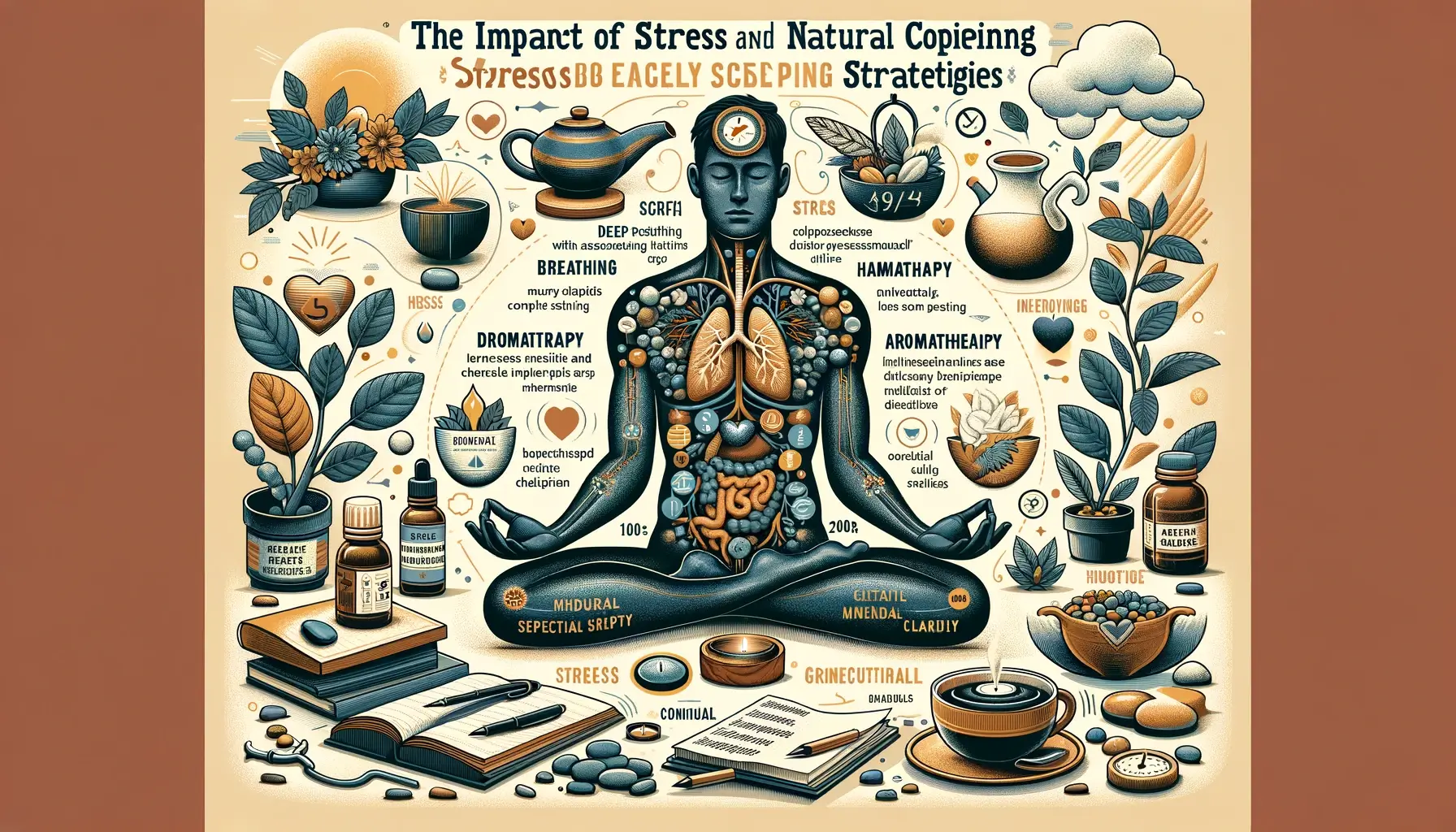This informative blog post explores into the intricate relationship between stress and health, exploring the detrimental effects that chronic stress can have on the body. Stress is a natural response to challenging situations, but when it becomes a constant presence in our lives, it can lead to a myriad of health issues. From increased risk of heart disease and weakened immune system to mental health disorders and digestive problems, the consequences of unmanaged stress are profound. However, amidst this grim reality, there is hope. By incorporating natural coping strategies into our daily routines, we can effectively combat the negative effects of stress and promote overall well-being.
Key Takeaways:
- Stress can have a significant impact on health: Chronic stress can lead to various health issues, including heart disease, high blood pressure, depression, and weakened immune system.
- Natural coping strategies can help mitigate stress: Engaging in regular exercise, practicing mindfulness and meditation, maintaining a healthy diet, and getting adequate sleep can help reduce stress levels and improve overall well-being.
- Seeking professional help when necessary is important: If stress becomes overwhelming or consistently impacts daily life, it’s essential to seek guidance from mental health professionals who can provide support and coping strategies.
The Manifestations of Stress
Physical Health Repercussions
Any challenge to our equilibrium, whether it be physical, mental, or emotional, can trigger the body’s stress response. This response is a natural survival mechanism that can be traced back to our ancient ancestors, who needed it to deal with immediate physical threats. However, in the modern world, the prolonged activation of this stress response can have detrimental effects on our physical health.
Chronic stress can manifest in various physical symptoms, including high blood pressure, weakened immune system, digestive issues, and even an increased risk of heart disease. The constant release of stress hormones like cortisol can put a strain on the body’s systems, leading to long-term health consequences.
Psychological and Emotional Toll
To the mind, stress can be just as insidious as it is to the body. Psychological manifestations of stress can include anxiety, depression, irritability, and difficulty concentrating. The constant state of alertness and worry can take a toll on our mental well-being, impacting our relationships, work performance, and overall quality of life.
Stress can also affect our emotional health, leading to feelings of helplessness, sadness, and even despair. The constant bombardment of stressors can wear down our resilience and coping mechanisms, making it harder to navigate life’s challenges.
With stress becoming an all too common part of modern life, it is essential to recognize the impact it can have on both our physical and mental well-being. By understanding the manifestations of stress, we can begin to take proactive steps to mitigate its effects and prioritize our health.
The Impact of Stress on Health and Natural Coping Strategies
Stress Responses from an Evolutionary Standpoint
Some stress responses can be traced back to our early ancestors and their need to survive in a hostile environment. When faced with a threat, the body’s stress response system kicks in, triggering the release of hormones like cortisol and adrenaline. These hormones prepare the body for fight or flight, allowing our ancestors to react quickly to dangers such as predators or natural disasters.
Any excessive or chronic stress can have harmful effects on the body over time. While this acute stress response was vital for survival in the past, modern lifestyles often expose us to chronic stressors that can lead to health problems like high blood pressure, weakened immune function, and mental health disorders.
The Role of Stress in Modern Human Society
Standpoint. In today’s fast-paced world, stress has become a pervasive part of daily life. The pressures of work, relationships, and societal expectations can all contribute to elevated stress levels. While some amount of stress can be motivating and help us perform better, chronic stress without adequate coping mechanisms can have detrimental effects on our overall well-being.
Evolutionary speaking, our bodies have not fully adapted to the constant stressors of modern society. It’s crucial for individuals to recognize the signs of stress and implement natural coping strategies to mitigate its impact on health. By understanding the evolutionary origins of stress responses and making conscious efforts to manage stress, we can strive towards a healthier and more balanced lifestyle.
Strategies for Managing Stress
Despite the inevitable presence of stress in our lives, there are various strategies we can employ to effectively manage it. By incorporating mindful practices and healthy habits, we can mitigate the negative impact of stress on our overall well-being.
Mind-Body Techniques and Their Efficacy
Any effective stress management regimen should include mind-body techniques that have been shown to reduce stress levels and promote relaxation. Practices such as meditation, deep breathing exercises, yoga, and tai chi have been scientifically proven to lower cortisol levels and calm the nervous system. These techniques not only help in the moment but also build resilience to future stressors.
Studies have demonstrated that regular engagement in mind-body techniques can improve mood, enhance mental clarity, and even boost immune function. By incorporating these practices into our daily routine, we can cultivate a sense of inner peace and balance amidst life’s challenges.

Nutrition, Exercise, and Sleep: Pillars of Stress Management
The cornerstone of stress management lies in maintaining a healthy lifestyle that prioritizes proper nutrition, regular exercise, and adequate sleep. Their interconnected roles in regulating stress hormones and promoting physical well-being make them essential components of any stress management plan.
MindBody Nutrition, exercise, and sleep form the foundation of a resilient body and mind. Proper nutrition provides the necessary fuel for optimal cognitive function and emotional stability. Regular exercise not only helps to reduce stress hormones but also releases endorphins that uplift mood and energy levels. Quality sleep allows the body to repair and rejuvenate, ensuring proper functioning of physiological processes essential for stress resilience.
Conclusion
Considering all points discussed, it is evident that stress has a significant impact on health and can lead to various physical and mental health issues. However, by employing natural coping strategies such as regular exercise, proper nutrition, mindfulness techniques, and seeking social support, individuals can effectively manage their stress levels and improve their overall well-being. It is crucial to prioritize self-care and adopt healthy lifestyle habits to combat the negative effects of stress on health.
FAQ
Q: What is stress’s impact on health?
A: Stress can negatively affect both physical and mental health. It can lead to a weakened immune system, increased risk of heart disease, high blood pressure, and mental health disorders such as anxiety and depression.
Q: How does stress affect the immune system?
A: Stress triggers the release of stress hormones like cortisol, which can suppress the immune system. This makes the body more vulnerable to infections and illnesses.
Q: Can stress contribute to heart disease?
A: Yes, chronic stress can contribute to the development of heart disease. It can lead to high blood pressure, inflammation, and unhealthy habits like overeating or smoking, all of which are risk factors for heart disease.
Q: What are natural coping strategies for managing stress?
A: Natural coping strategies for stress management include regular exercise, mindfulness meditation, deep breathing exercises, spending time in nature, maintaining a healthy diet, getting enough sleep, and seeking support from loved ones.
Q: How does stress impact mental health?
A: Stress can worsen mental health conditions such as anxiety and depression. It can lead to symptoms like mood swings, irritability, fatigue, and trouble concentrating. It is important to address and manage stress for overall well-being.

